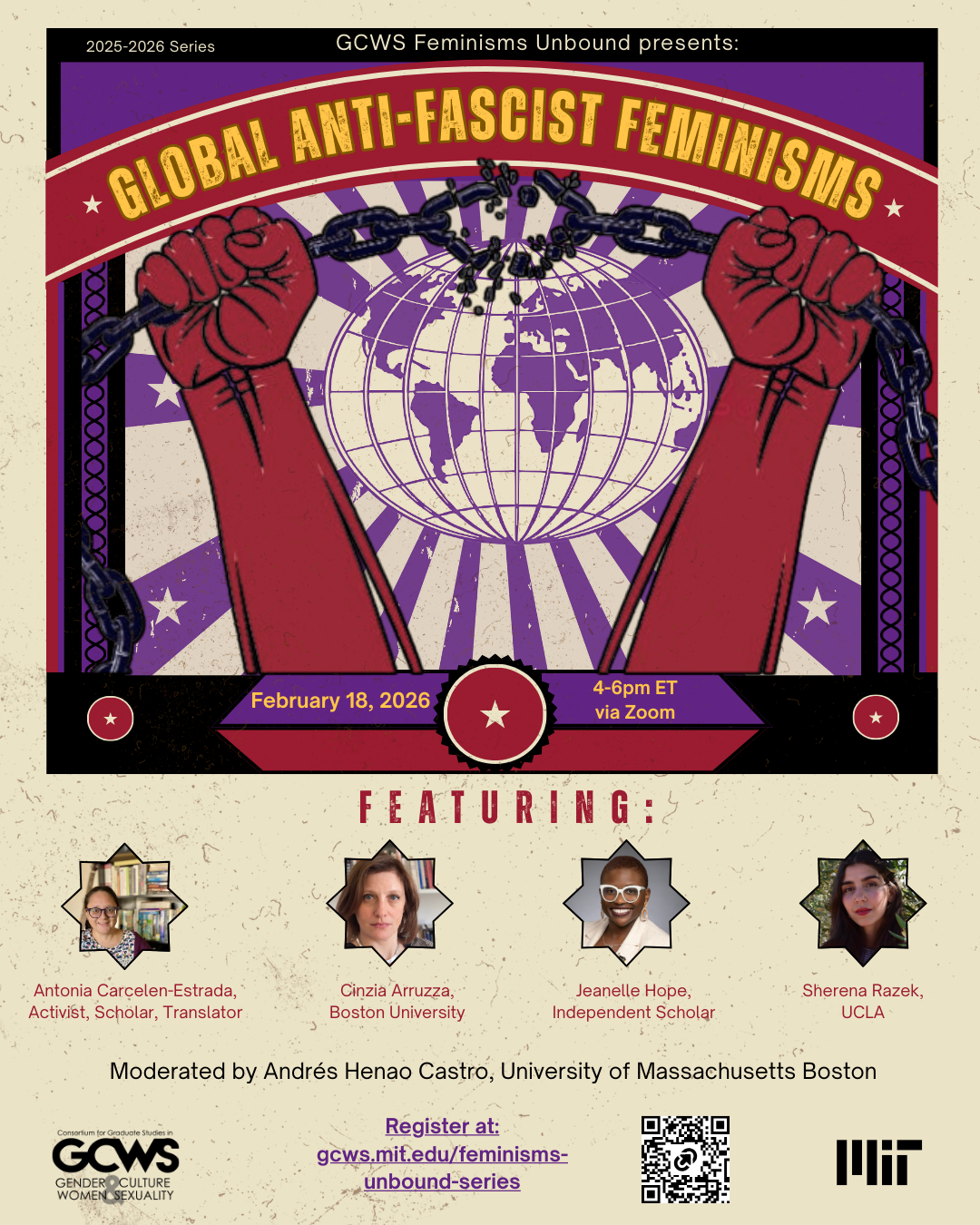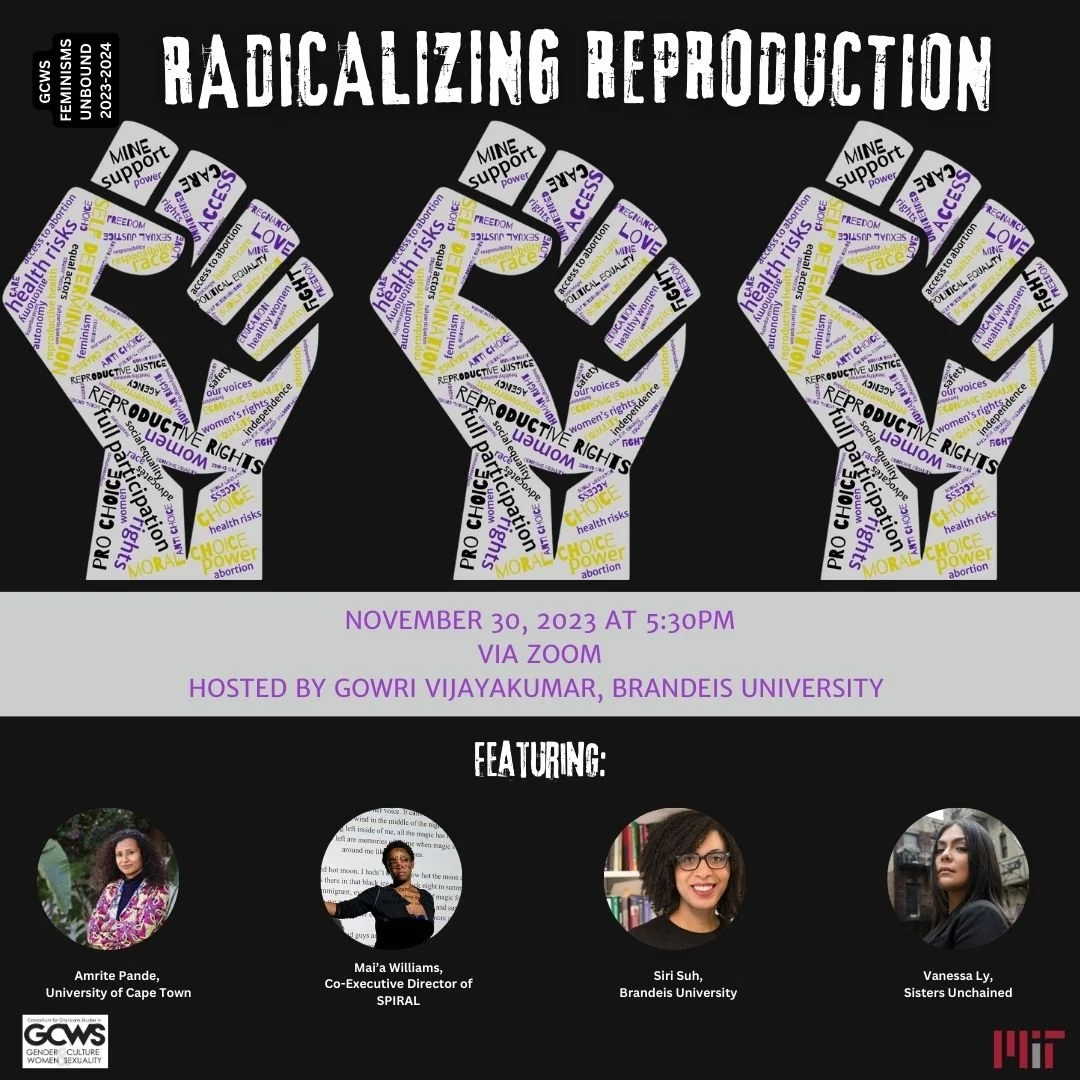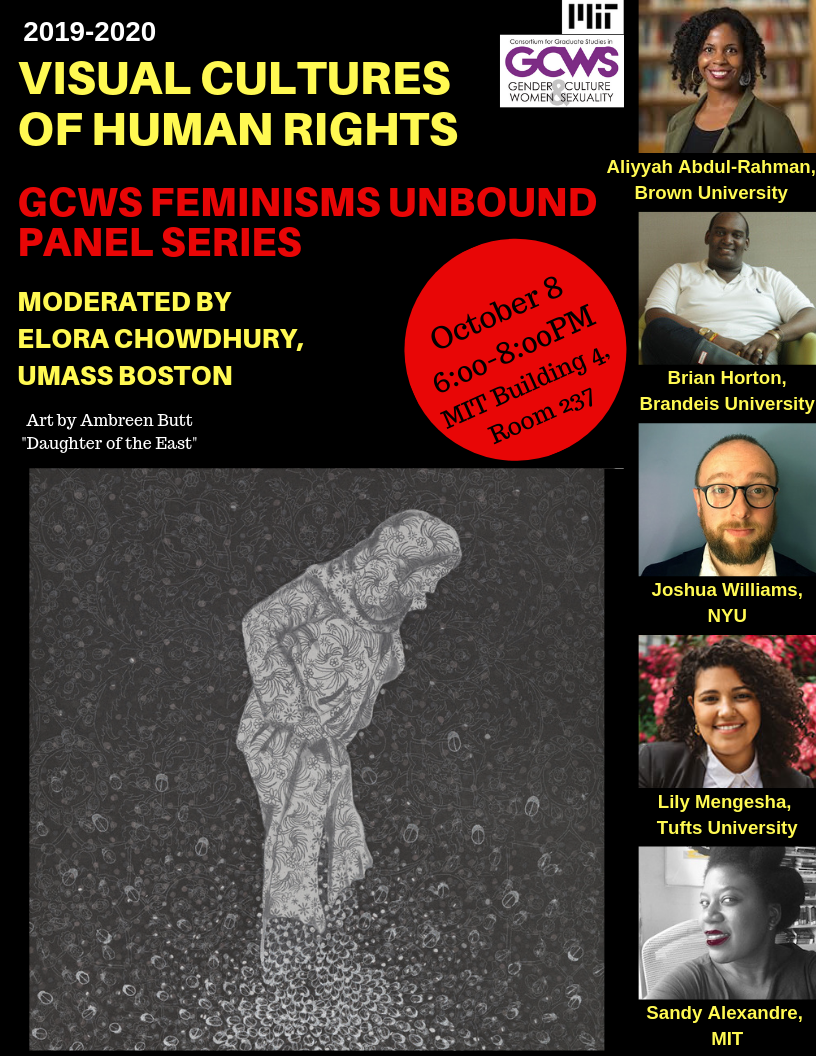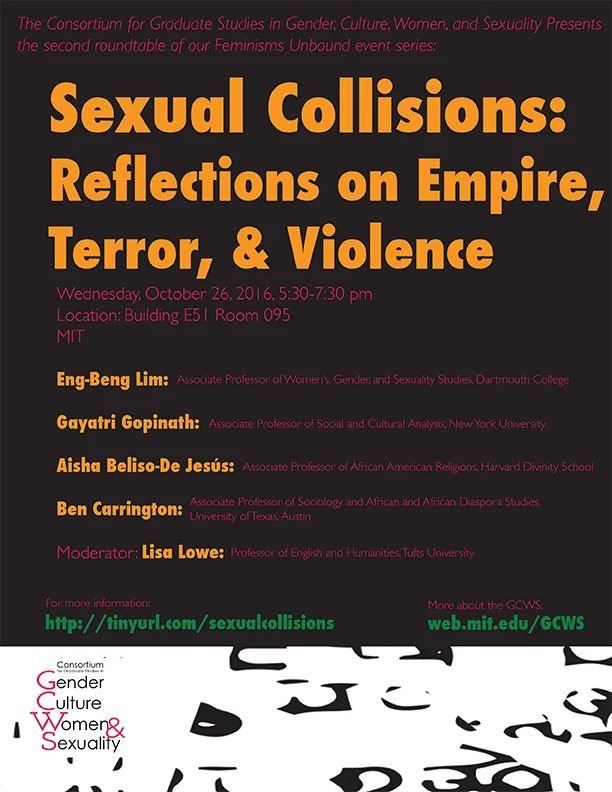
Feminisms Unbound
Feminisms unbound
GCWS has featured the Feminisms Unbound series for more than five years. This series is extremely popular with students, faculty, and the greater Boston feminist academic and activist communities. Feminisms Unbound, organized by GCWS affiliated faculty, features debates which focus on feminist concerns, theories, and practices in this contemporary moment. The goal of Feminisms Unbound is to foster conversations and community among Boston-area feminist intellectuals and activists. The series, in its open configuration, endeavors to allow the greatest measure of engagement across multiple disciplinary trajectories, and a full array of feminist investments. Feminisms Unbound is curated by a team of three faculty members who represent a number of institutions and disciplines.
Feminisms Unbound Team
Gowri Vijayakumar is an Assistant Professor of Sociology, Core Faculty in Women's, Gender, and Sexuality Studies, and Affiliated Faculty in South Asian Studies at Brandeis University. Her research and teaching use feminist, queer, and transnational lenses to illuminate the trajectories of social movements, the everyday life of the state, and the political economy of globalization. She is the author of At Risk: Indian Sexual Politics and the Global AIDS Crisis (Stanford University Press, 2021) and co-editor of Sociology of South Asia: Postcolonial Legacies, Global Imaginaries (Palgrave-MacMillan, forthcoming). She also worked with Akkai Padmashali to write her autobiography, A Small Step in a Long Journey (Zubaan, 2022). Her articles on the politics of pandemics, sex work, and gendered labor have appeared or are forthcoming in Social Problems, Gender & Society, Qualitative Sociology, World Development, Signs, and Contemporary South Asia.
Régine Michelle Jean-Charles is the Director of Africana Studies, Dean’s Professor of Culture and Social Justice, and Professor of Africana Studies and Women’s, Gender, and Sexuality Studies at Northeastern University. She is a Black feminist literary scholar and cultural critic who works at the intersection of race, gender, and justice. Her scholarship and teaching in Africana Studies include expertise on Black France, Sub-Saharan Africa, Caribbean literature, Black girlhood, Haiti, and the diaspora. She is the author of Conflict Bodies: The Politics of Rape Representation in the Francophone Imaginary (Ohio State University Press, 2014), The Trumpet of Conscience Today (Orbis Press, 2021), and Looking for Other Worlds: Black Feminism and Haitian Fiction (University of Virginia Press, 2022). She is currently working on two book projects–one explores representations of Haitian girlhood, and the other is a co-authored interdisciplinary study of sexual violence entitled The Rape Culture Syllabus. Dr. Jean-Charles is a regular contributor to media outlets like The Boston Globe, Ms. Magazine, WGBH, America Magazine, and Cognoscenti, where she has weighed in on topics including #metoo, higher education, and issues affecting the Haitian diaspora.
Sarah Luna is the Kathryn A. McCarthy Assistant Professor in Women's Studies in the Department of Anthropology and the Women’s, Gender, and Sexuality Studies Program at Tufts University. She earned her Ph.D. and M.A. from the University of Chicago and her B.A. from the University of Texas at San Antonio. She is a socio-cultural anthropologist whose research and teaching focus upon issues of sexual labor, missionary work, migration, race, borderlands, and queer studies. Her book, Love in the Drug War: Selling Sex and Finding Jesus on the Mexico-US Border, published by the University of Texas Press, was awarded the 2020 Ruth Benedict Book Prize by the Association for Queer Anthropology, the Gloria E. Anzaldúa Book Prize by the National Women’s Studies Association, and the Best Book in Social Sciences Prize by the Mexico Section of the Latin American Studies Association. She is currently conducting research about the politics of pleasure in queer spaces in Mexico City.
Upcoming Events
Our kickoff panel for the outstanding Feminisms Unbound panel series is on the subject of “Global Antifascist Feminisms”. The panel is designed to share organizing strategies and feminist practices across the globe, that have emerged to resist the resurgence and intensification of global authoritarianism today and to build more democratic and liberatory worlds.
Past Events
Our inspiration for this roundtable comes at a crucial time in light of the current administration; we want to amplify the importance of Black feminist scholarship and inquiry in this moment by offering multiple perspectives from different disciplines.
Porn is a longstanding site of feminist debate. In contrast to those who see it as a form of violence against women, this panel centers feminist artists and academics who see pornography as a tool for pleasure and politics. Sex educator, artist, and pornographer Annie Sprinkle inspired the Postpornography movement, which is currently thriving among sexual and gender dissidents throughout Latin America and Europe, who make their own porn from a queer or feminist lens. Black Feminist scholars in the United States have re-examined racialized pornography (which was associated with violence and pain), pushing for reading ecstasy, pleasure, and agency into the work of Black women pornographers. Further, scholars and activists have pushed for seeing porn as a form of labor that can be both a site of exploitation and of pleasure. We invite panelists to reflect upon both new pornographies and new ways of interpreting pornography as they intersect with feminist, queer, and anti-racist approaches.
Porn is a longstanding site of feminist debate. In contrast to those who see it as a form of violence against women, this panel centers feminist artists and academics who see pornography as a tool for pleasure and politics. Sex educator, artist, and pornographer Annie Sprinkle inspired the Postpornography movement, which is currently thriving among sexual and gender dissidents throughout Latin America and Europe, who make their own porn from a queer or feminist lens. Black Feminist scholars in the United States have re-examined racialized pornography (which was associated with violence and pain), pushing for reading ecstasy, pleasure, and agency into the work of Black women pornographers. Further, scholars and activists have pushed for seeing porn as a form of labor that can be both a site of exploitation and of pleasure. We invite panelists to reflect upon both new pornographies and new ways of interpreting pornography as they intersect with feminist, queer, and anti-racist approaches.
2024 marks 50 years since the iconic radical Black feminist group, Combahee River Collective, began meeting. As they write in their statement, which is unanimously recognized as an ur-text of radical feminist politics: “We are a collective of Black feminists who have been meeting together since 1974. During that time we have been involved in the process of defining and clarifying our politics, while at the same time doing political work within our own group and in coalition with other progressive organizations and movements.” Taking the work of Combahee as a point of departure, we take the occasion to meditate on “feminist collective/s” as an organizing force, a practice, and concept that is just as urgent in the 21st century as it has been in the history. Whether it reference a group acting together to achieve a goal, a gathering of people to be in community, or the power of collective organizing the idea of the “collective/s” is essential to feminist praxis. Our speakers will ruminate of the collective/s in various forms and from multiple perspectives.
This panel focuses upon emergent creative sexual pedagogies. Formal sex education often emphasizes risk, reproduction, and a cisheteronormative model of sex, seeking to discipline racially marked and low-income populations and often excluding while also pathologizing queer, trans, or gender nonconforming people. Thinking expansively about sexual pedagogies, this panel incorporates scholars, activists, and artists working in or writing about sexual pedagogy through an intersectional lens in contexts such as educational workshops, performance art, music videos, and postpornography. This panel asks: What is the relationship between sexualities education and social justice?
Reproduction is increasingly the locus of political panic, from attacks on abortion rights to ethical debates about new reproductive technologies. But moral panics about reproduction are nothing new. The reproduction of bodies and labor has been regulated and surveilled in the service of a variety of projects in a variety of historical contexts–tied to nationalism, capitalism, racial domination, class, gender, and sexual regulation. How can feminist scholarship, art, and activism clarify the forms reproductive governance can take, while pushing us to imagine more radical forms of reproductive care?
With every feminist critique of contemporary arrangements lies a vision of the world beyond–a feminist imagination. This panel explores artistic, scholarly, and activist practice and the utopian visions that drive and sustain it. What kinds of worlds do feminist, queer, trans, and other visionaries dream of? How do those worlds not only disrupt the existing gendered, sexual, racial, and imperialist capitalist order, but offer the possibility of new forms of collective and creative existence, and new forms of collaboration? What insights do these utopian visions have for feminist technologies, embodiments, labor relations, ecological arrangements, and creative practice? What fractures or failures do our utopian visions reveal? How do they link our feminist histories to our feminist futures? How do they begin to enact those visions in the present?
This panel brings together scholars, activists, and artists whose work attends to pleasure (sexual and otherwise) as a way of creating new worlds in contexts of inequalities and violence. Panelists work in different geographical and cultural contexts who center the powerful pleasures, joys, and world-making of populations at the intersection of sexual/gender dissidence and being marked by their race, class, or caste.
In the past decade we have seen renewed energy infused to the concept of care in feminist theorizing, writing, teaching, and organizing. How might we articulate a feminist ethic of care, and why does it matter? What does care look like in visual culture, writing, organizing, and thinking? If, indeed Black feminist theory in particular is “emphatically preoccupied with care” (as Jennifer Nash states in Black Feminism Re-imagined) how does one develop, display, and espouse an ethic of care in relation to feminist work? Why has care come to characterize so much of our work and what are the stakes of our preoccupation with care? In the context of 21st century assaults on racialized, sexualized, and gendered bodies, what does turning to care clear space for on the page, in the mind, in the community, and in the world? How does an ethic of care issue a challenge to models of consumption, accumulation, or production? What does it mean, look like, or feel like to place care at the center of feminisms?
With the provocation of return we invite panelists’ meditations in any of a number of possible directions. Return suggests resumption and rootedness, with attendant notions of convention, propriety, and origin. If it is commonplace to invoke detour and routes to counter these conscripting tendencies (or to question the desire for “returning to normal” in a year that has starkly illuminated the inequities we have learned to live with) are there also registers of precarity that may make return inviting or comforting? How is the returnee potentially persecuted (forced out to “secure borders”) in one space, and/or welcomed back as privileged national subject in the other? Return transforms the space of presence into perpetual deferral, into a scene of waiting, an interregnum. Repatriated cultural artifacts press us to imagine imperial histories of violent accumulation as well as orders of value, as in the assessment of returns on an investment. Finally, if return also suggests that which perpetually haunts, the refusal of what has been violently disappeared to stay away, then what are the spiritual practices that either counter or invite such visitations? We invite panelists to think through these and other inflections with us.
This roundtable is interested in the ways that sex, intimacy, and erotics are not only objects of study but also methods and methodologies for feminist, queer, and transgender studies. Queer ethnography has offered an extended engagement with the value of intimacy and desire in the field, and Black feminist theory has developed erotics as a means of thinking the political, sacred, and sexual together. In critical race and colonialism studies, intimacy has been used to describe the proximities and frictions that result from geopolitical rearrangements of power and capital. In queer and trans studies, BDSM, dungeons, public sex, erotic vomiting, and other dissident acts are crucial venues for re-organizing hegemonic formations of gender, class, and race, dragging colonial histories to the present, and inventing sexual futures. These are but some of the ways that sex, intimacy, and erotics open up new ways of thinking across disciplines.
Subaltern histories and lives within this apparatus are narrated through the lenses of dispossession, disenfranchisement, and social disposability. Feminist and queer cultural production nevertheless while conjuring such normative representational aesthetics simultaneously reimagine suffering, futurity, and human aspirations. Beyond representational revision, correction or uplift, expressive cultures have the capacity to call into question the very grounds of knowledge that make them possible and at the same time hint at new horizons of surviving and thriving.
“Going Viral” is an opportunity to think with the logics and lessons of the Covid-19 pandemic about the ways that intimacy, mobility, information, body, nation, gender, and sexuality are imbricated through viruses, and other transmittable forms.
The current pandemic is an accumulation of many viral histories. This panel invites scholars to draw form their original research to explore the traffic in viral discourse and the pathways of transmission—of data, bodies, feelings, ideology—through feminist, queer, and trans lenses.
From Australia to Hong Kong, USA to UK, Brazil to Bangladesh people are marching – masked, undeterred and resistant- demanding attention and justice with bold messages like “Silence is Violence”, “I Can’t Breathe”, and “No Justice No Peace.” These messages and movements lay bare the asymmetries of privilege and oppression, the unevenness of growth and wellbeing, and simultaneously encourage a social transformation that takes seriously interdependencies of life, humanity, and ecology. We invite panelists to think through the lessons of their areas of research and expertise and to shed light on how they are thinking about the paradoxes and power of protests.
As some statues are torn down and disappear before our very eyes, some quietly deteriorate unseen and unheralded, raising questions about posterity, and about the extent to which movements for justice depend on visual representation: what, then, of the resources of opacity and abstraction? Recent protests convened nightly vibrate with energy as statues are made to move differently, countering a terrible decades-long visual sovereignty. In this way removal also prompts reflection on the ways in which subaltern creativity has long been fueled by ingesting rather than excising the objectionable element. Finally, how do these public forms convene us (publicly or otherwise) as mourners, as defenders of the republic, as newly independent, as agents of reparative justice?
This panel takes its inspiration from our insistent critique of the academic corporation in which we find ourselves working today. Increasingly, our new colleagues are temporary and underpaid hires, who are nevertheless often expected to give service beyond teaching. Our senior administrators, compensated at the same levels as the corporate structure, are hired as much for their fundraising abilities as for their academic inclinations or interests. Juggling multiple jobs, our students are enmeshed in an aggregation of precarity that is not only financial: their protests of the institution’s raced, gendered, sexed and classed inequities, for instance, are repurposed into website photographs designed to advertise the institution’s openness to critique.
This panel invites scholars to consider the confluences between science and technology studies and gender and sexuality studies in their own research. Feminist, queer, and trans studies scholars attending to science, technology, environment, and disability are dismantling the rubrics of gender and body at the core of our fields in order to think more critically about the material conditions of living inside racial capitalism.
We invite panelists to respond to the questions of how human rights narrations have evolved and been expressed through fictional imaginations in literature, film and visual culture. How can we conceptualize the ethico-politics of human rights in such a way that it cannot be reduced to humanitarian “right to intervene” in the affairs of others?
This roundtable features a conversation about the genealogies and futures of black queer and trans studies across geographic and disciplinary borders, conversations that can help us take stock of the contradictory and complicated cultural moment we are in.
Can feminist praxis embrace an inherently anti-disciplinary vulnerability and refuse strictly bound notions, labels, frameworks, fields, or genres – including those assumed by invocations of ‘feminisms,’ ‘ethnography,’ or ‘research? Can notions such as solidarity and responsibility, trust and hope, vulnerability and reflexivity serve a useful purpose in ethically navigating the forms of epistemic violence in which metropolitan academics are, and will always remain, complicit?
With "The time of the border” we mean to invoke, of course, the terrible urgency of our current moment: the distinct but also overlapping historical, geographical, and other contexts that bear on the displacements of our time; border-crossings that claim our attention and others that remain invisible; conceptual frameworks that have meaningful explanatory power, but also do harm.
Roundtable discussion about Undoing Empire: Form, Function, Feminism
Roundtable discussion about Women of Color Feminisms in Authoritarian Times
This panel engages artistic practitioners who utilize their own bodies in their work. Three multi-media/performance artists will discuss the geographic parameters of their creative productions, the promise and perils of using their bodies as art, and the future of visual culture.
The final event of the Feminisms Unbound 2016-2017 year will be a roundtable of current GCWS doctoral students who are participating in the GCWS Workshop for Dissertation Writers in Women's and Gender Studies.
This roundtable hosts scholars and activists who intervene in the racialized, gendered, and queer aspects of our thoroughly mediated worlds, perspectives, subjectivities, and selves. These participants write and reflect critically on media forms, working within and across multiple modalities, ranging from the conventional to the digital and the emergent.
This roundtable brings together queer and feminist scholars of race, diaspora, performance, and religion to reflect on the gendered and sexualized dimensions of contemporary crises within racial capitalism, such as: masculinity and the militarization of policing; gender, race, and incarceration; the gendered criminalization of immigrant and diasporic religions; and queer responses to policing and the “war on terror.”
This roundtable considers the totality of the carceral state, from the vantage point of black women’s histories, testimonies, experiences and creative works. Three interdisciplinary scholars will gather to ponder all of the mechanisms of the prison system, from its long historical trajectory to literary and visual representations.
We welcome you to join us at this reception as we toast to local faculty who have recently published books on topics in Women’s, Gender, and Sexuality Studies. We will be celebrating over 30 books published since 2013 and the evening will include a book table where you can peruse copies of the featured works and very short book talks by our featured authors.
This panel will feature three feminist scholars who are conceptualizing new and evolving terminologies for the discourse of race, gender, and sexuality studies. The panelists, each trained interdisciplinarily, will consider the expansiveness of emerging language in the field along with the fraught limitations of contemporary keywords within feminism. The scholars will offer new terms for contemporary feminist studies, across and beyond disciplinary frameworks. Specifically, this event will utilize the multi-valent rubrics of digital media, film, and dance to participate in new ways of seeing and thinking through the field.































